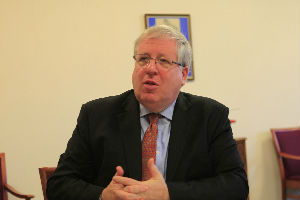Economic focus urged for cross-Straits ties
Updated: 2013-10-26 14:52
(Xinhua)
|
|||||||||||
NANNING - China's top political advisor, Yu Zhengsheng, on Saturday called for deepening mainland-Taiwan economic cooperation in order to further improve cross-Straits ties and reinvigorate the Chinese nation.
Economic cooperation should remain a focus in the development of cross-Straits relations, said Yu, chairman of the National Committee of the Chinese People's Political Consultative Conference, at the opening ceremony for the 9th Cross-Straits Economic, Trade and Culture Forum, which kicked off in the south China city of Nanning.
Yu said strengthened cross-Straits economic exchange is an inevitable choice for the two sides in the face of a complicated global economic situation.
He proposed more high-level dialogues on economics across the Straits and strengthening communication in economic policymaking to boost capabilities for resisting financial risk from the outside world.
Yu urged both sides to accelerate ongoing negotiations for a "good" trade agreement and a dispute settlement agreement as well as follow-up negotiations for the milestone Economic Cooperation Framework Agreement.
He also urged enacting and implementing agreements signed by the two sides.
Yu, also a member of the Standing Committee of the Political Bureau of the Communist Party of China (CPC) Central Committee, said the mainland and Taiwan should enhance industrial cooperation and expand mutual investment.
"Both sides should broaden the scope of mutual investment and get rid of obstacles that stand in the way of capital flow," Yu said.
He urged the two sides to further open their financial markets and promote cooperation between companies to jointly improve market competitiveness.
A visiting delegation headed by Wu Poh-hsiung, honorary chairman of the Kuomintang (KMT) Party, attended the forum, which was established by KMT and CPC leaders in 2006.
The forum has become a key platform for communication among members from the two parties and people from both sides.
Related Stories
Cross-Straits forum discusses political issues 2013-10-12 00:00
First cross-Straits peace forum opens in Shanghai 2013-10-11 20:40
Forum to pool cross-Straits political wisdom 2013-10-11 10:17
Cross-Straits ties not international relation: Ma 2013-10-10 19:09
Xi calls for peaceful development of cross-Straits ties 2013-10-06 14:06
Today's Top News
Forum calls on mutual responsibilities
Sino-EU to build trust, create co-op
FM's trip will deepen mutual understanding
Forum to guide China and Japan
China, EU said to manage trade frictions
Deposit insurance plan moving forward
China, Mongolia to up cooperation
Law revision gives new rights to online customers
Hot Topics
Lunar probe , China growth forecasts, Emission rules get tougher, China seen through 'colored lens', International board,
Editor's Picks

|

|

|

|

|

|





